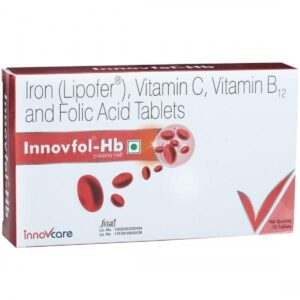ELEMENTAL IRON + FOLIC ACID B12
Elemental Iron: Elemental Iron is a medication that is used to treat iron deficiency anemia, which occurs when the body does not have enough iron to produce sufficient red blood cells. The drug is available in various forms, including tablets, capsules, and liquid.
The mechanism of action of Elemental Iron involves replenishing the body’s iron stores. Iron is an essential mineral that is necessary for the production of hemoglobin, a protein in red blood cells that carries oxygen throughout the body. When there is a deficiency of iron, the body is unable to produce enough hemoglobin, leading to anemia. By providing elemental iron, the medication helps restore the body’s iron levels and promotes the production of healthy red blood cells.
The dosage of Elemental Iron varies depending on the severity of the anemia and individual patient factors. Generally, the recommended dose ranges from 150 to 200 mg per day, taken orally. It is important to follow the doctor’s instructions and not exceed the prescribed dose.
Like any medication, Elemental Iron can have side effects. The most common side effects include gastrointestinal symptoms such as constipation, diarrhea, nausea, and stomach cramps. These symptoms can often be minimized by taking the medication with food or adjusting the dosage. Elemental Iron may also cause black or dark-colored stools, which is a harmless effect of the drug but can be alarming to some individuals. In rare cases, allergic reactions may occur, characterized by symptoms like rash, itching, swelling, or difficulty breathing.
Before taking Elemental Iron, it is advisable to inform the doctor about any pre-existing medical conditions, allergies, or medications being taken. This drug may interact with other medications and therefore it is important to discuss all the medications being used to avoid any adverse effects or interactions.
In conclusion, Elemental Iron is a medication used to treat iron deficiency anemia. It works by replenishing the body’s iron stores, promoting the production of healthy red blood cells. The dosage varies depending on the severity of the anemia, and common side effects include gastrointestinal symptoms. It is important to follow the doctor’s instructions and discuss any concerns or possible interactions before taking this medication.
Folic Acid B12: Folic Acid B12 is a combination medication that contains both folic acid and vitamin B12. Folic acid, also known as folate, is a type of B-vitamin that is important for the synthesis and repair of DNA, and it plays a crucial role in red blood cell production. Vitamin B12, also known as cobalamin, is another essential vitamin that is necessary for the normal function of the nervous system, the formation of red blood cells, and the metabolism of proteins and fats.
Folic Acid B12 is primarily used to treat or prevent deficiencies of folic acid and vitamin B12. It is commonly prescribed for individuals with conditions that may lead to a deficiency, such as malnutrition, alcoholism, poor diet, certain types of anemia, and during pregnancy to support fetal growth and development.
The mechanism of action of Folic Acid B12 is quite simple. Folic acid is converted to its active form, methyltetrahydrofolate, in the body, which is necessary for key metabolic processes involving DNA synthesis and repair. On the other hand, vitamin B12 aids in the conversion of folic acid to its active form and supports the normal functioning of the nervous system.
The typical dose of Folic Acid B12 is dependent on the specific condition being treated and the individual patient’s needs. It is typically taken orally as a tablet, usually once daily or as directed by a healthcare professional. The recommended dosage may vary, so it is important to follow the instructions provided by a doctor or pharmacist.
As with any medication, Folic Acid B12 can cause certain side effects. Common side effects may include mild gastrointestinal symptoms such as nausea, bloating, gas, or diarrhea. Allergic reactions to the medication are rare, but if any signs of an allergic reaction occur (e.g., rash, itching, swelling, severe dizziness, difficulty breathing), medical attention should be sought immediately.
In summary, Folic Acid B12 is a combination medication used to prevent or treat deficiencies of folic acid and vitamin B12. It works by supplying the body with these essential nutrients that are necessary for various metabolic processes and the normal functioning of cells. The dosage of Folic Acid B12 may vary depending on the individual and their specific needs. It is generally well-tolerated, but mild gastrointestinal side effects may occur.

